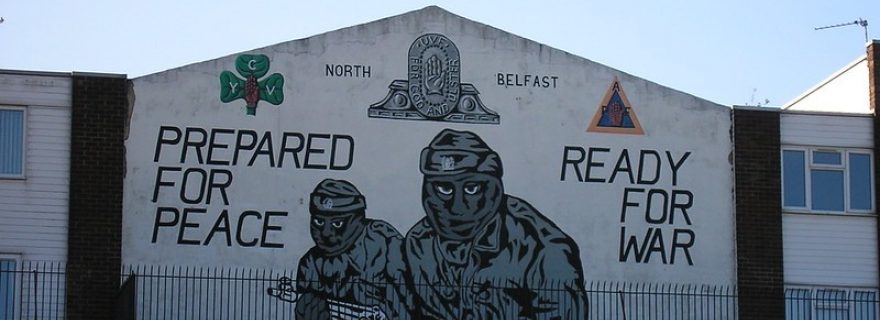Leaving our ‘Troubles’ behind?
In the wake of the riots in Northern Ireland is a return to violence an inevitable reality?
Rioting, masked protestors, buses set alight, attacks against police officers and journalists – scenes that were once all too familiar have become a reality once again on the streets of Northern Ireland. Dissatisfaction was sparked within loyalist communities over the handling of the Northern Irish protocol coupled with members of Sinn Féin evading prosecution for attending a funeral in breach of COVID-19 restrictions. This dissatisfaction has been exploited by factions within dissident loyalist paramilitaries linked to criminal networks such as the South East Antrim UDA, who are believed to be instigating the violence amongst youths on the streets. This recent spate of violence has put Northern Ireland under the spotlight, but tensions have been brewing for a while over its precarious fate in a post-Brexit scenario. Border disputes aside, the effects of Brexit are becoming a stark reality for those living in Northern Ireland, with added bureaucracy, border checks and regulatory restrictions causing major setbacks for daily businesses. With wounds still raw, animosity still rife between communities and the looming uncertainty over the fate of the border, such tensions are likely to only be exacerbated further. The question that arises is whether we are likely to see a return to the scale of the violence we saw during the Troubles.
Left Behind? Northern Ireland as a Brexit afterthought
The violence unfolding on the streets of Belfast is not just a result of Brexit’s repercussions. Teenagers aren’t taking to the streets in response to customs forms. It speaks to larger societal problems Northern Ireland faces in dealing with economic uncertainty, political turmoil and the effects of a prolonged lockdown. Still, tensions have undoubtedly been exacerbated by the fallout generated by 2016’s Brexit referendum. Despite voting with a majority of 55.8% to remain in the European Union (EU), Northern Ireland has been centre stage of negotiations, which have consistently exposed the UK government’s lack of empathy or foresight when it came to handling its fate in a post-Brexit scenario.
First, Theresa May leaned on the support of the Democratic Unionist Party (DUP) – a party that many in the UK might not have heard about until they were needed to prop up her Conservative majority. This arrangement already compromised the Good Friday Agreement (GFA) because it undermined the UK government’s impartial role in the peace process and in overseeing the power sharing arrangement in Northern Ireland’s executive. Ignoring these concerns, the DUP were at the forefront of negotiations in Brussels. Fast forward to Boris Johnson’s attempts to find a solution to the contentious border situation with unsubstantiated promises of ‘technological solutions’. Johnson promised unionists that his deal would result in no sea border and in no trade disruptions between Northern Ireland and the rest of Great Britain, which has been far from reality as costs and customs checks are already creating barriers for many Northern Irish businesses.
Mounting Tensions from both Loyalist and Nationalists
With the question of the border situation being loosely thrown around during negotiations, both loyalists and nationalists have voiced their dissatisfaction over the likely fallout in either scenario. Loyalists have outwardly expressed their dissatisfaction with the handling of the Northern Ireland Protocol – an arrangement which saw Boris Johnson renege on his promise not to establish a sea border between Northern Ireland and mainland Britain. On the 4th of March 2021, this dissatisfaction culminated in the Loyalist Communities Council (LCC), which represents loyalist paramilitary groups the Ulster Defence Association (UDA), the Ulster Volunteer Force (UVF) and the Red Hand Commando (RHC), withdrawing their support for the GFA, undermining the negotiations that put an end to a 30 year bloody conflict. More recently, dissident factions within the UDA and UVF have been accused of intigating the violence amongst youths in loyalist areas.
On the other side of the coin, nationalists have viewed the uncertainty over the state’s borders as an opportunity to renew their campaign for a United Ireland. The impetus for a referendum on the border situation has gained traction in recent months. Opinion polls indicated 51% of people surveyed in Northern Ireland supported a referendum to be held within the next five years. Although recent focus has been on loyalist paramilitaries, Europol’s 2020 report on terrorism recorded a marked upstick in violent incidents perpetrated by dissident republican groups such as the New IRA, Arm na Poblachta, and Óglaigh na hÉireann.
Return to Violence?
Taken together, are we are likely to see a return to the scale of the violence we saw during the days of the Troubles? The current upsurge in violence is unlikely to be a short-term affair, and the lack of leadership and tactical touting from politicians as well as paramilitaries have only served to aggravate the situation. However, the notion that we are facing a return to the days of the Troubles undermines the dedication towards progress and reconciliation across both communities. Rioting and recent activities linked to paramilitaries should not be sensationalised nor conflated with being representative of the views of everyday people living on either side of the dividing lines. Coverage surrounding Brexit and Northern Ireland tends to stoke up this divisive debate between loyalist and nationalist. This obscures the reality that for many in Northern Ireland the real concerns are not only those decided on political lines but on economic ones too. As citizens across Northern Ireland are confronted with the harsh realities of Brexit, the real concerns lie in securing future prospects and opportunities. Going forward, there will be less tolerance for getting caught up in the divisive sectarian debates, being dragged down by poor political leadership, or for having their fate decided at the hands of paramilitaries that once reigned.
Title Image Credit: Stefan Solleder: Unfinished Artefacts: The Case of Northern Irish Murals, CC BY 2.0


